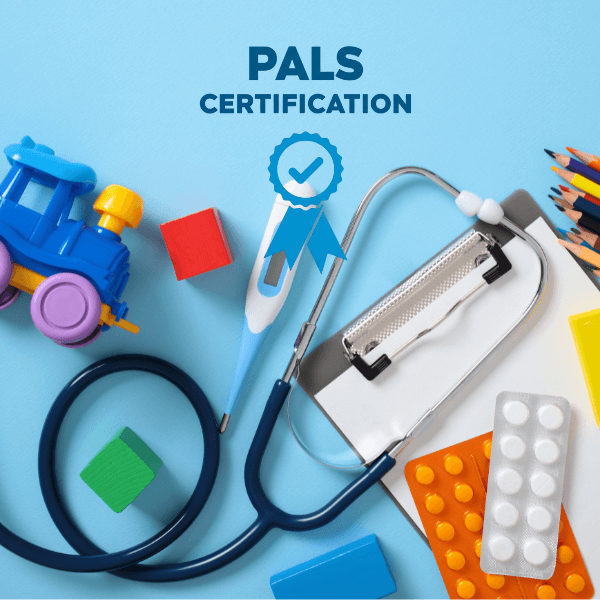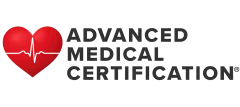Who Needs PALS Certification Course?
Are you a healthcare professional wondering if Pediatric Advanced Life Support (PALS) certification is a requirement for your job, or just recommended?
When it comes to pediatric emergencies, there’s little room for uncertainty. Children’s bodies respond differently than adults in cardiac or respiratory arrest, and recognizing those subtle, high-stakes differences can mean the difference between life and loss. In one clinical study,children treated by teams trained in pediatric-specific emergency protocols (like those taught in PALS training) had a 94% resuscitation success rate, compared to just 76% in standard care settings.
 For any clinician who works with infants or children in emergency, critical care, or pre-hospital settings, being certified in Pediatric Advanced Life Support means knowing how to assess, respond, and lead when a child’s life is in danger.
For any clinician who works with infants or children in emergency, critical care, or pre-hospital settings, being certified in Pediatric Advanced Life Support means knowing how to assess, respond, and lead when a child’s life is in danger.
Who Needs PALS Certification?
PALS certification is hugely important for anyone responsible for responding to emergency situations involving infants and children. These are the most vulnerable patients we have, so if you work in a hospital, an ambulance, or a clinic, the ability to assess and manage pediatric cardiac arrest, shock, or respiratory failure could be the most important skill you carry.
Here are some of the roles where PALS certification is recommended (if not outright required):
- Doctors in Pediatrics and Emergency Medicine
- ICU and Critical Care Nurses
- EMTs and Paramedics
- Critical Care Physicians and Hospitalists
- Nurse Anesthetists (CRNAs)
- Respiratory Therapists
- Medical Transport Personnel
- Clinic Assistants or Child Care Staff who want to add life-saving skills to their résumé
And here’s one of the most common questions we hear:
Is PALS certification worth it for general nurses?
Absolutely. Even if you’re not in a pediatric unit every day, emergencies don’t always wait for specialists. Whether you’re the first responder in a clinic, a float nurse called to an ICU, or simply working in a setting where children might enter your care, having PALS certification could help you save a young life. It’s also a strong professional asset and resume builder that signals your readiness for a wider variety of roles.
Who Can Be PALS Certified?
To complete the PALS curriculum, you should already be trained in Basic Life Support (BLS) as it provides the foundation for all advanced life-saving care. PALS builds on that course by teaching specialized skills like pediatric airway management, rhythm recognition, and post-resuscitation support.
We should note that while PALS is not legally mandatory for all pediatric-focused healthcare providers, it is, broadly speaking, highly recommended and often required by employers, especially in emergency or critical care settings. If you’re in a position where you’re responding to pediatric codes in a hospital or preparing for your pediatric rotation, PALS prepares you to act when a child’s life is on the line.
Is PALS only for nurses?
No. PALS is designed for a wide range of healthcare professionals who may need to respond to pediatric emergencies. In addition to registered nurses (RNs and APRNs), PALS is useful for:
- Paramedics and EMTs
- Respiratory Therapists
- CRNAs and Anesthesia Teams
- Medical Students and Residents (especially those rotating in pediatric-focused units)
Who can use PALS in the field?
Any of the professionals above may be required to use PALS knowledge in real-world care, particularly those working in:
- Pediatric wards and ICUs
- Emergency departments
- Urgent care clinics
- Ambulance and transport settings
- Surgical or procedural units
Do I need both BLS and PALS?
Yes. BLS is a prerequisite for PALS because it teaches the core principles of CPR and emergency response. PALS takes it a step further, guiding you through how to manage complex pediatric emergencies, lead a code team, and stabilize infants and children until full care can be delivered. Keep in mind that you’ll need current BLS certification before beginning your PALS course.
Who Doesn’t Need PALS Certification?
While PALS certification is critical for many medical professionals, it’s not necessary for everyone. You likely don’t need PALS certification if you are a general medical practitioner without pediatric or emergency care responsibilities. The same goes if you’re a caregiver or daycare worker without a clinical role or medical training requirements.
That said, if you regularly interact with children and want to be prepared for emergencies, BLS certification can still provide valuable life-saving skills.
How PALS Certification Sets You Apart?
In high-stress pediatric emergencies, a PALS certification will help you understand what role you play. Whether you’re the first on the scene or part of the critical care team, PALS sets you apart by training you in pediatric-specific protocols that go far beyond general resuscitation techniques.
For direct responders (looking at those nurses, paramedics, physicians, and respiratory therapists out there in emergency or ICU settings), PALS certification prepares you to:
- Lead or assist during code blue events involving children
- Respond rapidly to cardiac or respiratory arrest in infants
- Deliver pediatric care during pre-hospital transport situations
- Recognize early warning signs before deterioration
For supportive roles (aka those not usually first to respond to a pediatric crisis), PALS will teach you how to:
- Communicate effectively during pediatric codes
- Understand and anticipate pediatric interventions
- Provide safer, more informed care during high-risk procedures or recovery
Emergencies involving pediatric patients that require life support are rare, fortunately. But when they happen, they escalate fast. The good news is that research shows optimized emergency care not only improves survival but also helps children stabilize faster and leave the hospital sooner, easing pressure on clinical teams and enhancing patient flow.
 Other Certifications for Pediatric Life Support
Other Certifications for Pediatric Life Support
Can you work in pediatrics with BLS only?
Yes, depending on your role. The Basic Life Support (BLS) certification covers fundamental emergency care skills like CPR, AED use, and basic airway management. If you work in outpatient pediatrics, a non-critical care setting, or a support role, BLS may be sufficient. However, if you’re expected to respond during a pediatric code, PALS certification is strongly recommended.
Is ACLS or NRP a substitute for PALS?
No. Here’s a quick look at the different purposes each certification serves:
- ACLS (Advanced Cardiovascular Life Support) focuses on adult emergency protocols.
- NRP (Neonatal Resuscitation Program) is specific to newborns under 28 days old, especially in delivery rooms and NICUs.
- PALS is the gold standard for managing infants and children beyond the neonatal period through adolescence. In some roles, PALS and NRP may both be required.
What certifications are best for school staff, caregivers, or childcare workers?
For non-medical professionals, CPR and First Aid certification is typically the best fit. These courses provide essential life-saving skills without requiring clinical experience, making them ideal for:
- Teachers and school staff
- Daycare providers
- Babysitters and foster parents
- Camp or youth program leaders
PALS is not necessary for these roles, but knowing how to safely do CPR can save a child’s life while waiting for emergency responders.
Ready to Take the Next Step in Pediatric Care?
If you’re ready to get certified in Pediatric Advanced Life Support, you could sign up for a standard course, or you could make an investment that pays off for your entire career. AMC’s PALS Certification For Life grants you full certification now and unlimited recertifications every two years with no extra fees or classroom requirements.
Here’s what you get with PALS For Life:
- 100% online training, built to fit your schedule
- Instant digital provider card, with a printed copy available
- Up to 8 AMA Category 1 Credits™, issued by an accredited provider (PIM)
- Unlimited free exam retakes
- Money-back guarantee
- Exclusive access to video, audio, and written materials
- Savings of over $1,500 across the course of your career
Whether you’re early in your medical career or recertifying for the fifth time, AMC’s PALS For Life course lets you stay certified – forever – with just one payment. Get started on your PALS training today.

